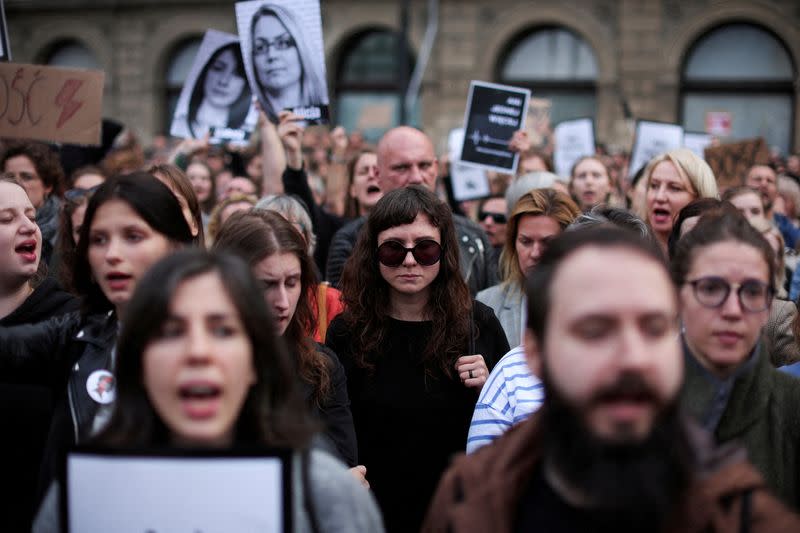Role of women in society at stake in Polish election

By Anna Wlodarczak-Semczuk
WARSAW (Reuters) - In 2021, a young woman came to a hospital in eastern Poland to get an abortion: she was suffering from severe mental distress because the fetus she was carrying had the lethal defect anencephaly. The doctors refused her the procedure for fear of breaking the law.
The case of Agata, whose surname is not publicly known, exemplifies what Poland's liberal opposition sees as an erosion of women's rights during the eight-year rule of the nationalist Law and Justice (PiS) party.
Agata later obtained an abortion elsewhere, according to activists who helped her, but her plight resonates with many ahead of Sunday's election in which women's rights have emerged as a key campaign issue.
With the number of undecided female voters twice as high as men in most age groups, according to a Batory Foundation report, sociologists say the opposition's success in galvanising them could tip the scales.
"PiS doesn't respect women," Magdalena Bojko, a 36-year-old office worker, said during an opposition rally this month.
Asked what she hoped PiS' main rival, Civic Coalition (KO), might do if it wins, she said: "Guarantee we can bear children in dignity, have access to IVF."
PiS says it aims to boost fertility rates and support families, while pushing back against liberal values that clash with Poland's Catholic heritage.
Since winning power in 2015, it has ended state funding for IVF and enforced a prescription requirement for emergency contraception, as well as launching a universal child benefit and cash incentives for women to have at least four children.
It says it opposes abortion but argues the 2021 ban, which makes an exception for terminations only in the case of rape, incest or a threat to the woman's health, is a result of a Constitutional Tribunal ruling it had no power over. Its rivals say the court is politicised, which PiS denies.
REPRODUCTIVE RIGHTS
Polls show PiS is likely to win but its support has waned, in part because of its record on women's rights and the rule of law. Some surveys show the mainstream opposition could form a majority government even if PiS is in first place.
"Whose votes should we be fighting for? ... Women in their 30s and 40s. Those who are disheartened about politics in general but increasingly worried about their own status," a senior KO official told Reuters.
Political scientists say massive protests that swept through Poland over the abortion ban in recent years may motivate some female voters to support the opposition, but may also have convinced others their voice doesn't count.
"This young generation in particular has been severely psychologically damaged, absolutely disregarded, ridiculed, sometimes humiliated," said Anna Materska-Sosnowska from Warsaw University.
KO says it will seek legislation to allow for abortion up to 12 weeks without limitations if it wins, in a major turnaround for the party which has shied away from picking a stance on the issue for years.
Fertility rates in Poland fell to the lowest since World War Two this year. Activists say that's in part because women are scared of having children following a handful of cases when pregnant women died of sepsis in hospitals as doctors waited for the fetus' heart to stop beating.
"There is a belief that due to the current legislation in Poland ... one can simply die from being pregnant," said Antonina Lewandowska from the Foundation for Women and Family Planning. "Women in Poland are terrified."
FAMILY SUPPORT
Some women say the issue of reproductive rights is blown out of proportion and that social programmes introduced under PiS, such as child benefits or tax breaks for large families, have improved their lives.
"The opposition says the biggest problem for women is the lack of access to abortion. I don't think so," said Anna Giszczak-Dobek, a 43-year-old teacher and mother of five who will vote for PiS.
"I'm more interested in whether someone will support my family, whether someone here and now will have an idea on how to solve my everyday problems."
Karolina Kowalewska, a 33-year-old teacher, said she was scared to get pregnant although she wanted children. "I was afraid nobody would help me. You see those cases of girls who died in hospitals because doctors waited for the fetus to die ... Our right to decide for ourselves has been taken away."
When she finally did, she had two doctors overseeing her pregnancy, out of fear one might not tell her if there was anything wrong with the fetus.
Would she consider having another child? "If the law changes? Yes, for sure," she said.
(additional reporting by Agnieszka Pikulicka-Wilczewska and Kuba Stezycki; writing by Justyna Pawlak; Editing by Christina Fincher)

 Yahoo News
Yahoo News 
